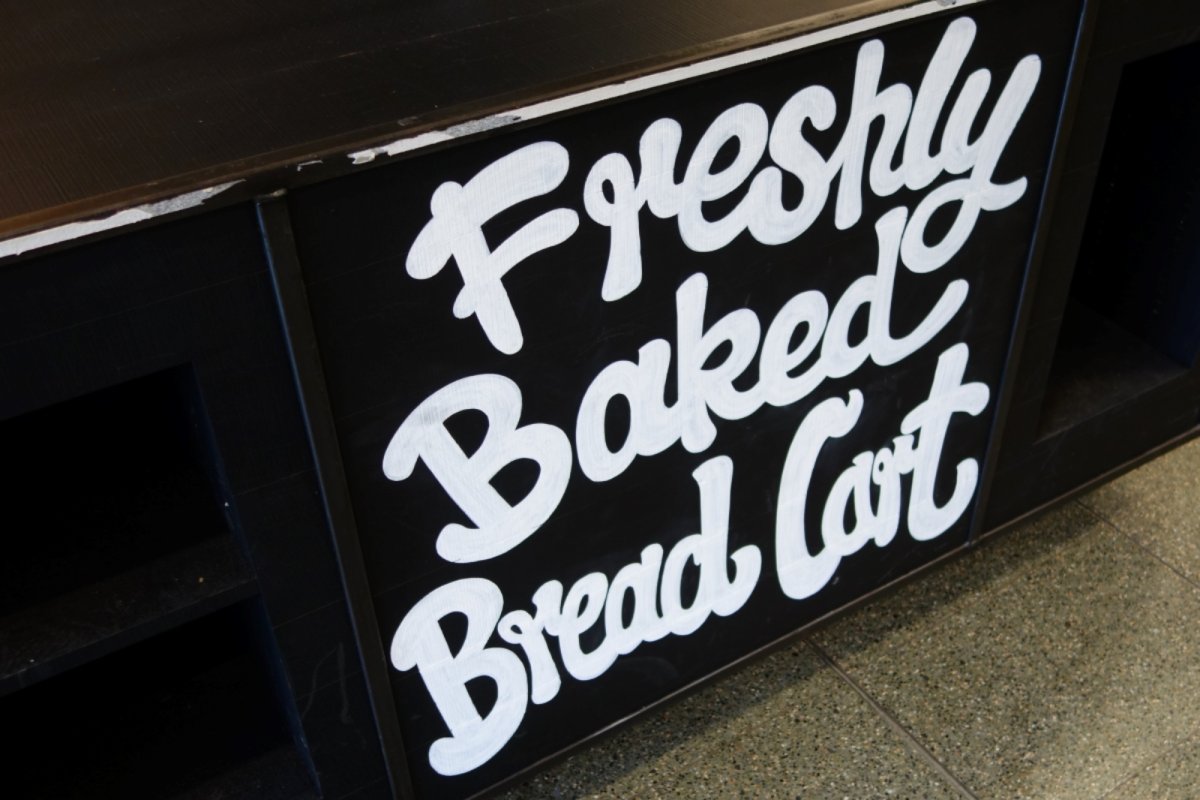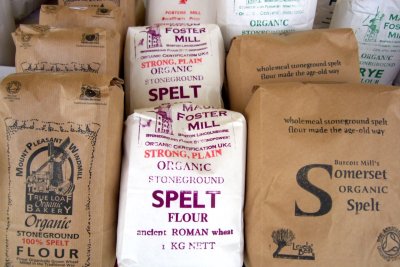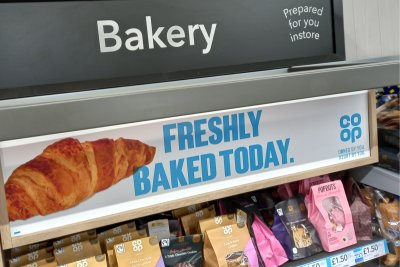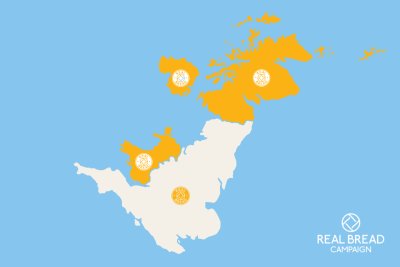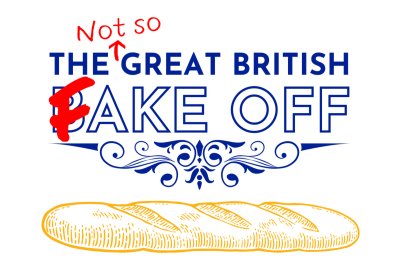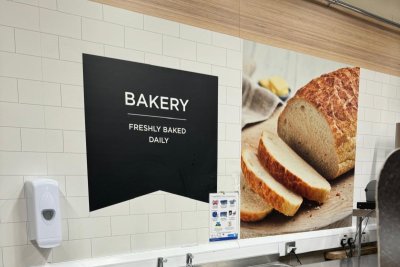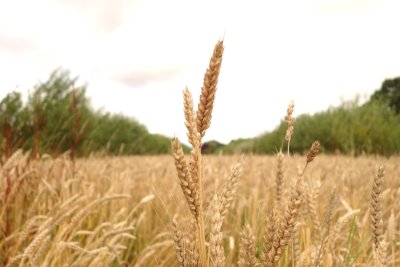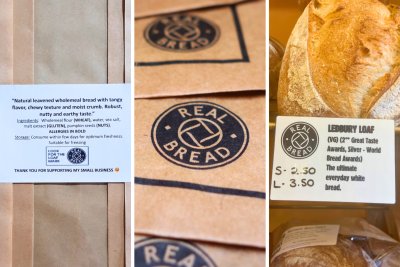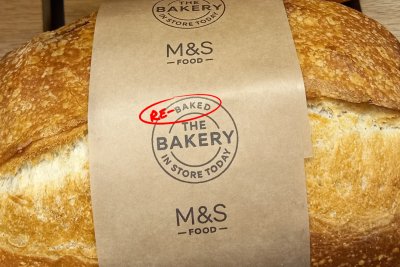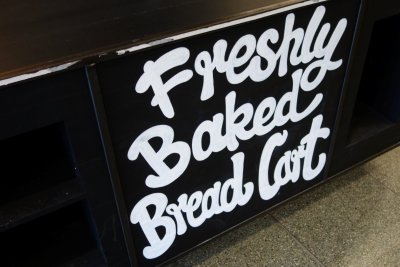 Freshly baked is a term without legal definition. Credit: Chris Young / www.realbreadcampaign.org CC-BY-SA-4.0
Freshly baked is a term without legal definition. Credit: Chris Young / www.realbreadcampaign.org CC-BY-SA-4.0
Responding to a letter from the Real Bread Campaign about Defra’s forthcoming review of the Bread and Flour Regulations, Food Standards Agency CEO, Emily Miles, wrote: “I understand that proposals to add specific legal definitions for sourdough, artisan, craft, ancient, heritage, fresh, and freshly baked breads were considered but did not end up within the scope of the review.”
She did not answer the Campaign’s questions on full ingredient labelling or a legal definition of wholegrain, which also form part of its Honest Crust Act proposals.
Real Bread Campaign coordinator, Chris Young, said: “We’re shocked that, having finally agreed with us that a review of the outdated regulation of loaf labelling and marketing is long overdue, Defra has decided to sweep our proposals off the table without public consultation or even proper discussion. Apparently they have no appetite to protect shoppers or small business owners. We’re also disappointed that the FSA doesn’t seem to want to support our proposals.”
He added: “This is an issue of honesty, transparency and people being able to make better-informed choices. The need for people to be able to trust that they’re getting what they’ve been led to believe they are paying for is greater now than it has been for generations. We find the frequently peddled line about current arrangements providing ‘robust protection against misleading practices’ just laughable.”
The Real Bread Campaign has written again to Defra and the FSA.
The need for legal definitions
At present, a product can be:
- Made with highly-refined flour as the main ingredient, with a very small percentage of wholemeal flour, and yet marketed under the healthy halo of ‘wholegrain’.
- Made, baked, frozen, transported a great distance (even from another country), then baked for a second time, and yet marketed as ‘freshly baked’, ‘baked in store’ or similar.
- Made using additives, with little to no live sourdough starter culture, and leavened using baker’s yeast or baking powder, and yet marketed as ‘sourdough bread’.
- Made in large quantities in a factory, using a computer-controlled, highly-mechanised process, using additives that no true artisan baker would use, and yet be marketed as ‘artisan bread’.
- Made with highly-refined, modern wheat flour as the main ingredient, with a very small percentage of another grain, and yet marketed using terms such as ‘heritage wheat’ or ‘ancient grains’.
None of these terms has a legal definition, giving companies more or less unfettered ability to use them prominently in product names, front of pack descriptions and other marketing designed to steer shoppers into make buying decisions, in some cases at a premium price.
There is little to no evidence that the Food Information to Consumers Regulation is being used to prevent this. The Advertising Standards Authority has rejected a number of complaints made by the Real Bread Campaign since 2009 about what we believe to be misleading use of such marketing terms, typically citing the lack of a legal definition as a key factor in their decision.
The Real Bread Campaign believes that claims of freshness and place of production being used (notably by multiple retailers) to market products that were made elsewhere and merely re-baked in store can undermine the market for genuinely fresh bread from a nearby SME bakery. The latter supports highly-skilled and more jobs per loaf for people from that local community and helps to keep more money circulating in it. There is also a negative environmental impact of re-baking, which uses around twice as much energy as baking a loaf once, and results in products that tend to stale very quickly, increases the likelihood of those products being wasted.
The need for full ingredient labelling
While a shopper should not have to turn to an ingredients list to verify what is claimed or implied by the use of terms such as those listed above, full ingredient labelling is still essential for whatever reason that person needs or wants this information.
A baked product can be made using any number and type of ingredient and food additive, yet if the product is sold unwrapped, it is not mandatory for the retailer to declare all of these on labelling or point of sale display. It has been suggested that retailers could provide this information by other means - verbally or by digital media, for example. This argument, however, is undermined by the facts that not every shopper owns a smartphone, or has the time to wait in the hope that a member of staff will return with the requested ingredients list. As food allergen requirements clearly demonstrate, declaration of ingredients and additives at point of sale is possible.
In the case of so-called processing aids, current regulation allows manufacturers to hide the use of these additives-by-another-name from buyers of even prepacked food. This is despite the possibility (as is permitted by current regulation) that their residues or by-products might remain in the finished product.
Evidence and scale of impact
According to industry statistics, something like 99.8% of UK households buy products marketed as bread and around 12 million loaves are sold each day. The figures indicate that perhaps 17% of these loaves (ie more than 2 million every day) are bought from in-store bakery sections, which typically use claims of freshness and/or place of production.
In January 2017, the YouGov Everyday Health Tracker found that 75% of more than 2000 respondents believe the term ‘wholegrain’ to be a healthy food claim.
A large body of evidence around the potential benefits of sourdough fermentation is summarised in Thirty years of knowledge on sourdough fermentation: A systematic review. This is based on an examination of 1230 peer reviewed research articles published between 1990 and 2020.
Around 1000 micro and other SME bakeries have listed their additive-free loaves on the Real Bread Map, representing just a fraction of the SMEs in this sector. They are facing ever-increasing competition from companies with enormous marketing budgets that are leaving or leading shoppers to understand that the nature, identity, properties, composition, place of provenance and method of production are other than they are. Existing legislation is not adequate for the current market or to meet shoppers’ rights and other needs.
Guidance and regulation
The Campaign recognises the value of FSA guidance in helping consumer protection bodies to prevent shoppers from being misled. An example was Pret a Manger being banned by the Advertising Standards Authority and the trading standards department of the company’s Primary Authority from using the word ‘natural’ to market sandwiches and other food made using a range of additives.
This case, however, also demonstrates one of our concerns about non-binding guidance. From our initial complaint, it took around a year and a half for the decision to be made. We believe that the issue would have been resolved more quickly (and perhaps not even arisen) had a simple and unambiguous, legal definition been in place.
More directly related to our Honest Crust Act proposals, despite existing FSA guidance, 'freshly baked', 'baked in store' and similar claims are still commonly made to market loaves that have been re-baked (rather than made fresh from scratch) in store. Clearly, the industry is not adequately self-regulating on this issue, and evidently consumer protection bodies are not preventing the practice from being widespread.
We would, therefore, welcome FSA creating guidance in addition (and perhaps as a precursor) to our proposed legal definitions and mandatory ingredient listing, rather than instead of these.
We are wary, however, of the suggestion of industry self-regulation for the reasons we outlined in our response to a proposed code of practice sent to Defra in 2019.
See also
Real Bread Campaign: The Real Bread Campaign finds and shares ways to make bread better for us, better for our communities and better for the planet. Whether your interest is local food, community-focussed small enterprises, honest labelling, therapeutic baking, or simply tasty toast, everyone is invited to become a Campaign supporter.
Sustain
The Green House
244-254 Cambridge Heath Road
London E2 9DA
020 3559 6777
sustain@sustainweb.org
Sustain advocates food and agriculture policies and practices that enhance the health and welfare of people and animals, improve the working and living environment, promote equity and enrich society and culture.
© Sustain 2024
Registered charity (no. 1018643)
Data privacy & cookies
